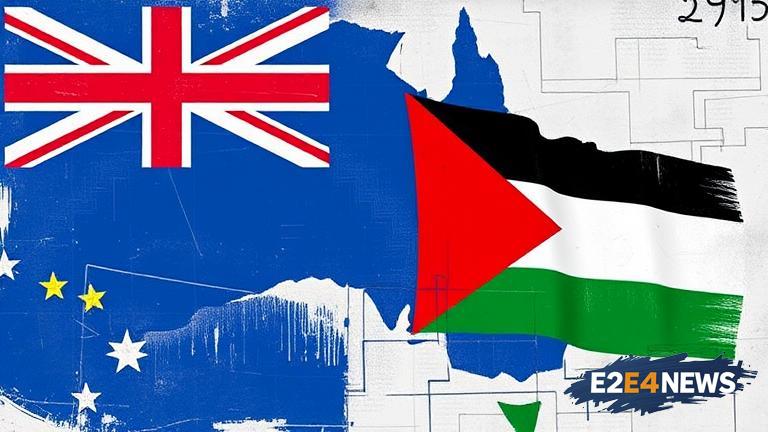The question of whether Australia should recognize Palestine as a sovereign state has been a topic of discussion for many years. Recently, the Australian government has been weighing the pros and cons of such a move, with some arguing that it would be a significant step towards achieving peace in the Middle East. Others, however, claim that recognition would be premature and could potentially destabilize the region. The Israeli-Palestinian conflict has been ongoing for decades, with both sides claiming sovereignty over the same land. The international community has been trying to broker a peace agreement, but so far, none have been successful. Recognizing Palestine as a state would likely have significant implications for Australia’s relationships with both Israel and the Palestinian Authority. It could also have repercussions for the country’s trade and diplomatic relationships with other nations in the region. The Australian government has been under pressure from various groups, including human rights organizations and pro-Palestinian advocacy groups, to recognize Palestine as a state. These groups argue that recognition would be a moral imperative, given the suffering and displacement of the Palestinian people. On the other hand, pro-Israel groups have been lobbying against recognition, arguing that it would be a betrayal of Australia’s long-standing friendship with Israel. The Israeli government has also been vocal in its opposition to recognition, claiming that it would undermine the peace process and create a precedent for other countries to follow. Despite these concerns, many countries around the world have already recognized Palestine as a state, including several European nations and many countries in the Middle East and Africa. The United States, however, has not recognized Palestine as a state, and has instead maintained its support for a two-state solution to the conflict. The Australian government’s decision on whether to recognize Palestine as a state will likely be influenced by a range of factors, including its relationships with other countries, its commitment to human rights and international law, and its own domestic politics. The government will also need to consider the potential economic and trade implications of recognition, as well as the potential impact on the country’s security and defense relationships with other nations. In recent years, there have been several attempts to resolve the Israeli-Palestinian conflict through negotiations, but so far, none have been successful. The most recent attempt, led by the United States, ended in failure, with both sides unable to agree on key issues such as borders and settlements. The conflict has also been marked by periods of violence and instability, including the recent Gaza wars and the ongoing settlement expansion in the West Bank. Despite these challenges, many people remain hopeful that a peaceful resolution to the conflict can be found, and that recognition of Palestine as a state could be an important step towards achieving this goal. The Australian government’s decision on recognition will be closely watched by the international community, and will likely have significant implications for the country’s relationships with other nations and its role in the region. The government will need to carefully consider the potential consequences of recognition, and weigh the competing interests and arguments of different groups and nations. Ultimately, the decision on whether to recognize Palestine as a state will depend on a range of complex factors, including politics, diplomacy, and international law. As the Australian government weighs its options, it will be important to consider the potential impact on the country’s relationships with other nations, as well as the potential consequences for the Israeli-Palestinian conflict and the broader region. The recognition of Palestine as a state would be a significant development in the conflict, and would likely have far-reaching implications for the region and the world. It would also be an important step towards achieving a two-state solution, which is widely seen as the most viable way to resolve the conflict. However, the path to recognition will not be easy, and will require careful diplomacy and negotiation. The Australian government will need to work closely with other nations and international organizations to achieve a peaceful resolution to the conflict, and to ensure that recognition of Palestine as a state is done in a way that promotes stability and security in the region.
